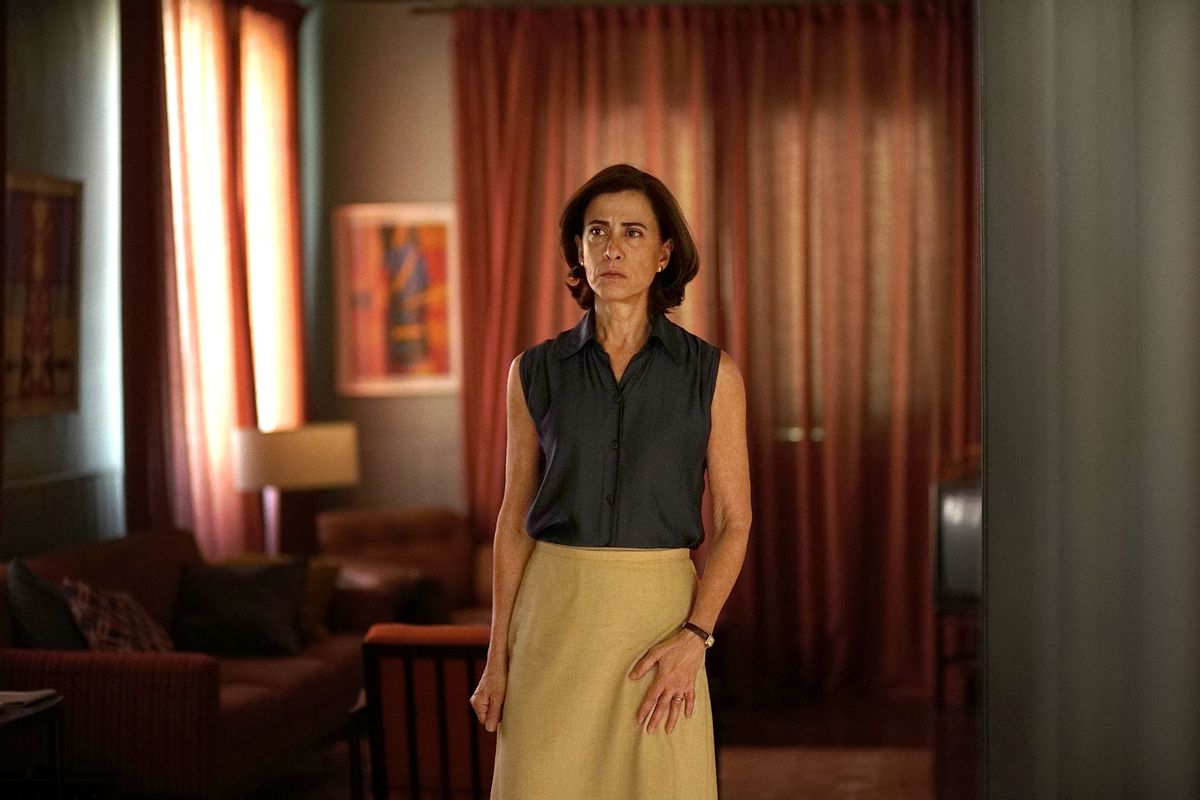Home invasion movies are often so effective because they prey on a very simple fear: Someone could, at any time, enter the peaceful space you dwell in and upend that comfort. In a moment, the serenity of the home instantly becomes perilous and repugnant. In order to live, we tuck this fear away in the back of our minds, convincing ourselves that it could never be us while we deadbolt the door and silently pray that fate doesn’t have us on its list.
Walter Salles’ “I’m Still Here,” however, is not the typical home invasion movie. There are no violent assaults, stolen goods or damaged property. The film doesn’t feature any of the tropes that we’ve desensitized ourselves to. It is simply a tale of how easily our repose can be inverted into repulsion. And that’s what makes it all the more terrifying.
After Rubens Paiva crossed the threshold of his front door, his family never saw him again.
The film takes an intimate look at Brazil six years into the military dictatorship that held the country in its grip until 1985, after a coup removed president João Goulart from power in April 1964. Under military control, political dissidents and those suspected of corruption were questioned, tortured, exiled and killed depending on the perceived severity of their opposition to the military state. Rubens Paiva, a former Brazilian congressman who left politics after he was exiled from Rio for opposing the dictatorship, was among the thousands who were tortured and the hundreds who went missing or were killed. As brutal as Paiva’s forced disappearance was, its start was ordinary, even calm. Hands of the military, dressed in civilian clothes, rang the bell at his family’s home and asked Paiva to come with them for questioning. After Paiva crossed the threshold of his front door, his family never saw him again.
“I’m Still Here” hones in on the days before Paiva’s disappearance and the long, tenuous aftermath that threatened to tear his family of six asunder. Paiva’s wife, Eunice, is played with searing resolve by Fernanda Torres, whose performance earned the veteran Brazilian actor a Golden Globe at the Jan. 5 ceremony. As Eunice, Torres subverts the image of a doting homemaker suffering in the absence of her breadwinning patriarch. She doesn’t agonize or tolerate her predicament, she endures. Torres’ fortitude brims from the screen like sweet maternal comfort. Among all of the women in contention for an Oscar this year, Torres’ work stands out as the warmest; a wonderfully complex performance that spotlights the work mothers do, and how often and innately they must bear the weight of the world in silence to keep it from burdening their families.
As the film opens, we meet Eunice in a rare moment of solitude, able to relieve herself from the world’s heft as she floats weightlessly in the ocean across from her home. Mother to four young girls — Vera (Valentina Herszage), Eliana (Luiza Kosovski), Ana Lúcia (Barbara Luz) and Maria (Cora Mora) — and one boy, Marcelo (Guilherme Silveira), Eunice is kept busy by her family’s ever-changing needs. They rarely discuss the dictatorship in their house, but keep up with the news on television. As she glides along the surface of the water, a military helicopter flies overhead, portending a change Eunice can’t yet imagine. Just as she has cast herself adrift, trouble is on its way to do the same to her family.
Want a daily wrap-up of all the news and commentary Salon has to offer? Subscribe to our morning newsletter, Crash Course.
Screenwriters Murilo Hauser and Heitor Lorega allow ample time for audiences to glimpse at the everyday goings on of the Paiva family. We watch as they gather with friends for soufflé and frolic at the beach, we join them for ice cream and admire their adopted stray dog that Rubens (Selton Mello) names Pimpão, after Vera’s playboy boyfriend. It’s an idyllic existence, made all the more picturesque by the comforts that their wealth brings them. Rubens, now a civil engineer, plans to construct a beautiful new home, where they can see the silhouette of Rio’s Christ the Redeemer monument from their yard.
On an ordinary day, Rubens and Eunice play backgammon and reminisce about Vera, who’s spending her Christmas in London with family friends and plans to stay to pursue her education. They feel she’s far safer there. When there’s a knock at their door, their suspicions are proven correct. Four men enter and ask to speak with Rubens, who acquiesces and goes upstairs to put on a shirt and tie, accompanied by one of the visitors. Eunice calmly addresses her children, telling them that the men are from pest control. When Eliana returns from a beach volleyball game as Rubens is changing, she goes to her father and asks to borrow one of his dress shirts. “Do I have a choice?” he replies warmly. This sweet line is laced with a nauseating dread. Rubens is as powerless to the requests of his dear daughter as he is to the man standing across from him who has a gun tucked into his waistband, just out of sight. But Rubens’ good nature belies his distress, and Eliana leaves the room smiling.
 Fernanda Torres as Eunice in "I’m Still Here” (Courtesy of Sony Pictures Classics/Alile Onawale)
Fernanda Torres as Eunice in "I’m Still Here” (Courtesy of Sony Pictures Classics/Alile Onawale)
Shortly after, Rubens is escorted from his home, but three other men stay behind, telling Eunice that they will leave when Rubens returns. When that will be, they don’t know. With Rubens away, it’s up to Eunice to make sure that Eliana and the rest of her children continue to smile. Her children’s safety is questionable, but Eunice, like any mother, doesn’t want to let them know until it’s absolutely necessary. Only Eliana, her second oldest daughter and the oldest child in the house, can be made aware of what’s happening. Their day continues normally with dinner and foosball. Ana Lúcia, Maria and Marcelo go to sleep that night none the wiser. Eunice has successfully shielded her family from horrible knowledge, leaving herself to bear the brunt of the panic.
In the following sequences, Torres wears Eunice’s stoicism on her face like a mask so seamless that one can’t quite tell where the confidence ends and the fear begins. Her eyes are stern and unyielding, meeting the gaze of those quietly threatening her family. When Eunice and Eliana are both brought into the military base for questioning, Eunice retains her composure. But Torres’ work is keenly layered. Her effortless conviction in how Eunice addresses her husband and kids does not match how she speaks with military officers. In front of them, she is impassive and unflappable. Yet, brilliantly, Torres exudes tenderness all the same. She and her family may be under duress, but her motherly instinct lives inside of her, keeping the flame. Eliana is released after one night. Eunice is held for 12 days.
The affection and maternal care Torres radiates as she embodies this character is a revelation. She doesn’t just pull the viewer into her family, she extends her hand and asks us to join her.
But even when she’s made to be the political prisoner, Eunice refuses subjugation. She knows that, after her release, the military who are watching her house and tapping her phone would love nothing more than to see her spiral and look on with glee while cracks form and her family fissures. But Eunice won’t allow herself or her family to become anyone else’s example. As she goes on to lead the search for her husband’s whereabouts and publicly challenge the military in the press, she leads with her head held high, adamantly refusing to let her family become the picture of national tragedy. When a local tabloid photographs the Paivas, the photographer asks if they can look sadder to illustrate their plight to readers. Eunice looks around at her children, perched on their front steps, and laughs in response. “We’ll smile,” she says.
The affection and maternal care Torres radiates as she embodies this character is a revelation. She doesn’t just pull the viewer into her family, she extends her hand and asks us to join her. Hailing from Rio herself, and born just after the military came into power, Torres grew up witnessing these stories firsthand. She brings a direct knowledge to this role that is absolutely essential in telling the story with the grace and dignity it so deserves.
Torres’ is the kind of innately empathetic performance that we’re not always afforded as viewers. Eunice gave her children, her country and thousands of people affected by forced disappearances the gift of her stalwart determination. And, in its own way, Torres’ work as Eunice feels like a gift. How often do we get to watch a movie and recognize the unmistakable geniality that adorns a mother’s love? Rarely do we witness a performance that’s so unembellished and yet so memorable and moving. There are few big, capital-A “Acting” moments in “I’m Still Here,” but Torres doesn’t need fits of sobbing and screaming or sappy, tearful caresses of a framed photograph. There is a clear, aching power to her unwavering tenacity. To exaggerate Eunice’s histrionics would betray her authority.
Though the film’s title is the same as Marcelo Paiva’s autobiography, on which the movie was based, Salles and Torres give “I’m Still Here” a stunning updated resonance in the film’s two codas. While the denouement does somewhat rattle the story’s gripping momentum up to that point, its final scenes are critical to understanding the full scope of what Eunice did for her family, long after Rubens’ disappearance. We meet the Paivas in 1996, and again in 2014. In the ’90s, Brazil has become a democracy once more, and the Paivas are as loving and close as ever because of what their mother did for them. And in 2014, Salles checks in with Eunice and her children at a family reunion. Eunice, now living with advanced Alzheimer’s, is a smaller shadow of her once-tall self. But as she sits, observing it all, her stoicism is just the same. Like so many mothers, forced to carry on for the sake of their families in the wake of tragedy, her children are her greatest work: living, breathing examples of perseverance. The loving presence of her husband, which she refused to ever part with, has been passed down by Eunice; his warm grin, held as a memory within her. And, in one final family photo, Eunice smiles just the same.
Read more
about other stellar performances in Oscar contention



Shares